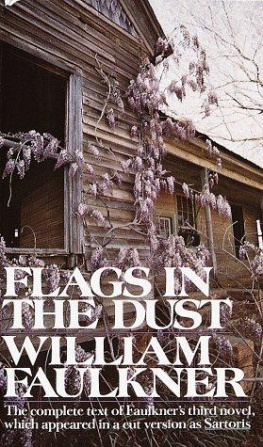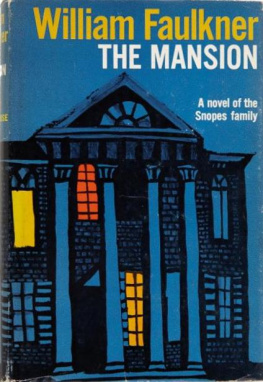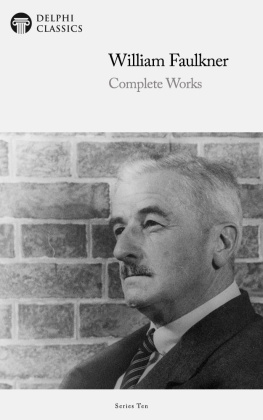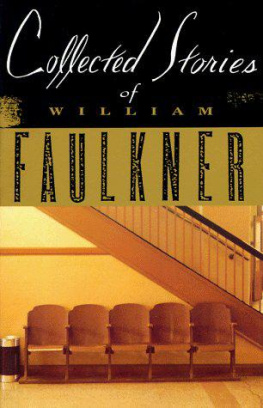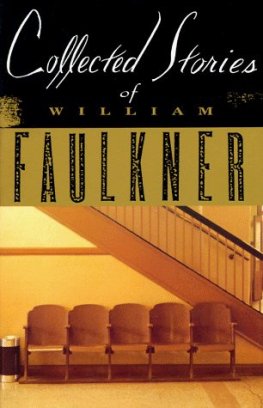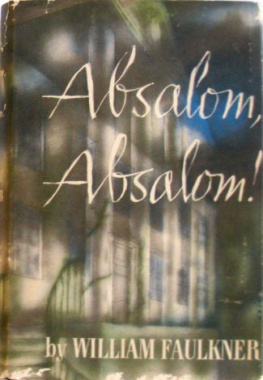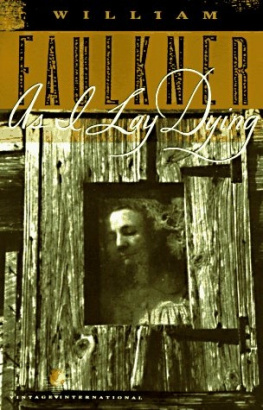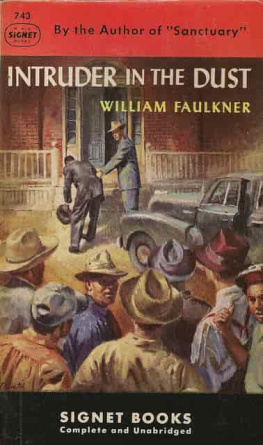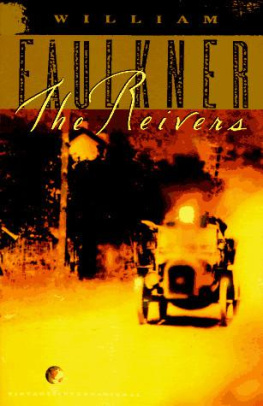William Faulkner - A Fable
Here you can read online William Faulkner - A Fable full text of the book (entire story) in english for free. Download pdf and epub, get meaning, cover and reviews about this ebook. year: 1999, publisher: Turtleback Books: A Division of Sanval, genre: Art. Description of the work, (preface) as well as reviews are available. Best literature library LitArk.com created for fans of good reading and offers a wide selection of genres:
Romance novel
Science fiction
Adventure
Detective
Science
History
Home and family
Prose
Art
Politics
Computer
Non-fiction
Religion
Business
Children
Humor
Choose a favorite category and find really read worthwhile books. Enjoy immersion in the world of imagination, feel the emotions of the characters or learn something new for yourself, make an fascinating discovery.
- Book:A Fable
- Author:
- Publisher:Turtleback Books: A Division of Sanval
- Genre:
- Year:1999
- Rating:5 / 5
- Favourites:Add to favourites
- Your mark:
- 100
- 1
- 2
- 3
- 4
- 5
A Fable: summary, description and annotation
We offer to read an annotation, description, summary or preface (depends on what the author of the book "A Fable" wrote himself). If you haven't found the necessary information about the book — write in the comments, we will try to find it.
A Fable — read online for free the complete book (whole text) full work
Below is the text of the book, divided by pages. System saving the place of the last page read, allows you to conveniently read the book "A Fable" online for free, without having to search again every time where you left off. Put a bookmark, and you can go to the page where you finished reading at any time.
Font size:
Interval:
Bookmark:
Long before the first bugles sounded fromthe barracks within the city and the cantonments surrounding it, most of thepeople in the city were already awake. They did not need to rise from the strawmattresses and thin pallet beds of their hive-dense tenements, because few of them save the children had even lain down. Instead, they hadhuddled all night in one vast tongueless brotherhood of dread and anxiety,about the thin fires of braziers and meagre hearths, until the night wore atlast away and a new day of anxiety and dread had begun.
Theoriginal regiment had been raised in this district, raised in person, in fact,by one of those glorious blackguards who later became Napoleon's marshals, whodelivered the regiment into the Emperor's own hand, and along with it becameone of the fiercest stars in that constellation which filled half the sky withits portent and blasted half the earth with its lightning. And most of itssubsequent replacements had been drawn from this same district, so that most ofthese old men were not only veterans of it in their time, and these malechildren already dedicated to it when their time should come, but all thesepeople were parents and kin, not only the actual old parents and kin of thedoomed men, but fathers and mothers and sisters and wives and sweethearts whosesons and brothers and husbands and fathers and lovers might have been among thedoomed men except for sheer blind chance and luck.
Evenbefore the bugles' echoes died away, the warrened purlieus were alreadydisgorging them. A French or British or American aviator (or a German eitherfor that matter, if he had had the temerity and the luck) could have watched itbest: hovel and tenement voiding into lane and alley and nameless cul-de-sac,and lane and alley and cul-de-sac compounding into streets as the trick-lesbecame streams and the streams became rivers, until the whole city seemed to bepouring down the broad boulevards converging like wheel spokes into the Placede Villa, filling the Place and then, pressed on by the weight of its ownconverging mass, flowing like an unrecoiling wave up to the blank gates of theHotel where the three sentries of the three co-embattled nations flanked thethree empty flagstaffs awaiting the three concordant flags.
Theymet the first troops here. It was a body of garrison cavalry, drawn up acrossthe mouth of the wide main boulevard leading from the Place to the old gate inwhat had once been the city's ancient eastern wall, already in position andwaiting as though the murmur of the flood's beginning had preceded it, rightinto the bedroom Wednesday of the town-major himself. But the crowd paid noattention to the cavalry. It just continued to press on into the Place, slowingand stopping now because of its own massy congested weight, merely stirring andshifting constantly and faintly within its own mass while it stared, mazed andpatient in the rising light, at the Hotel door.
Thenthe sunrise gun crashed from the old citadel above the city; the three flagsbroke simultaneously from nowhere and climbed the three staffs. What they brokeand climbed and peaked in was still dawn, hanging motionless for a moment. Butwhen they streamed on the first morning breeze, they streamed into sunlight,flinging into sunlight the three mutual colors-the red for courage and pride,the white for purity and constancy, the blue for honor and truth. Then theempty boulevard behind the cavalry filled suddenly with sunlight which flungthe tall shadows of the men and the horses outward upon the crowd as though thecavalry were charging it.
Onlyit was the people advancing on the cavalry. The mass made no sound. It wasalmost orderly, merely irresistible in the concord of its frail components likea wave in its drops. For an instant the cavalry-there was an officer present,though a sergeant-major seemed to be in charge-did nothing. Then thesergeant-major shouted. It was not a command, because the troop did not stir.It sounded like nothing whatever, in fact: unintelligible: a thin for-lorn cryhanging for a fading instant in the air like one of the faint, sourceless,musical cries of the high invisible larks now filling the sky above the city.His next shout though was a command. But it was already too late; the crowd hadalready underswept the military, irresistible in that passive and invinciblehumility, carrying its fragile bones and flesh into the iron orbit of thehooves and sabres with an almost inattentive, a humbly and passively contemptuousdisregard, like martyrs entering an arena of lions.
Foranother instant, the cavalry held. And even then, it did not break. It justbegan to move in retrograde while still facing for-ward, as though it had beenpicked up bodily-the white-rolled eyes of the short-held horses, the high,small faces of the riders gaped with puny shouting beneath the raised sabres,all moving backward like the martial effigies out of a gutted palace or mansionor museum being swept along on the flood which had obliterated to instantaneousrubble the stone crypts of their glorious privacy. Then the mounted officerfreed himself. For a moment, he alone seemed to be moving, because he alone wasstationary above the crowd which was now parting and flowing on either side ofhim. Then he actually was moving, forward, breasting the still short-bittedhorse, iron-held, into and through the moving crowd; a voice cried oncesomewhere beneath the horse-a child, a woman, possibly a man's voiceeunuch-keened by fear or pain-as he forced the horse on, feinting and dodgingthe animal through the human river which made no effort to avoid him, whichaccepted the horse as water accepts a thrusting prow. Then he was gone.Accelerating now, the crowd poured into the boulevard. It flung the cavalryaside and poured on, blotting the intersecting streets as it passed them as ariver in flood blots up its tributary creeks, until at last that boulevard toowas one dense seething voiceless lake.
Butbefore that, the infantry had already arrived, debouching from the Place deVille on the crowd's rear long before the cavalry officer could have reportedto the officer of the day, who would have dispatched the orderly, who wouldhave summonsed the batman, who would have interrupted at his ablutions and shavingthe adjutant, who would have waked the town-major in his nightcap, who wouldhave telephoned or sent a runner to the infantry commander in the citadel. Itwas a whole battalion, armed except for packs, emerging from the Place de Villein close route column, led by a light tank with its visor closed for action,which, as it advanced, parted the crowd like a snow plow, thrusting the dividedparting back from either curb like the snow plow's jumbled masses, the infantrydeploying into two parallel files behind the advancing tank, until at last thewhole boulevard from the Place to the old gate was clear and empty againbetween the two thin lines of interlocked bayoneted rifles. A slight commotionrose at Wednesday one point behind the dyke of bayonets, but its area was notten feet and it did not spread, and only those near it knew that any-thing washappening or had happened. And when a platoon sergeant stooped under theinterlocked rifles and shouldered his way in, there was not much to see either:only a young woman, a girl, thin and poorly dressed, who had fainted. She layas she had fallen: a thin huddle of shabby, travel-stained garments, as if shehad come a long distance and mostly on foot or in farm carts, lying in thenarrow grave-shaped space they had made for her to fall in, and, if such hadbeen her intention, die in, while those who apparently had made no room for herto stand erect and breathe in, stood looking quietly down at her as peoplewill, until someone makes the first move. The sergeant made it.
'Atleast pick her up,' he said savagely. 'Get her up out of the street where she wont be trampled.' A man moved then, but as he and thesergeant stooped, the woman opened her eyes; she even tried to help as thesergeant hauled her to her feet, not roughly, just impatient at the stupidlycomplicating ineptitude of civilians at all times, particularly at this one nowwhich kept him from his abandoned post. 'Who does she belong to?' he said.There was no answer: only the quiet attentive faces. Apparently he had expectednone. He was already glancing about, though he had probably al-ready seen thatit would be impossible to get her out of the crowd, even if anyone had offeredto take charge of her. He looked at her again; he started to speak again, toher this time, but stopped him-self, furious and contained-a thick man offorty, moustached like a Sicilian brigand and wearing the service and campaignribbons of three continents and two hemispheres on his tunic, whose racialstature Napoleon had shortened two or three inches a hundred years ago asCaesar had shortened that of the Italians and Hannibal that of the namelesspediment-pieces of his glory-a husband and father who should (perhaps evencould and would) have been a custodian of wine casks in the Paris Halles if heand the Paris Halles had been cast on some other stage than this. He glancedagain at the patient faces. 'Doesn't anybody-'
Font size:
Interval:
Bookmark:
Similar books «A Fable»
Look at similar books to A Fable. We have selected literature similar in name and meaning in the hope of providing readers with more options to find new, interesting, not yet read works.
Discussion, reviews of the book A Fable and just readers' own opinions. Leave your comments, write what you think about the work, its meaning or the main characters. Specify what exactly you liked and what you didn't like, and why you think so.


